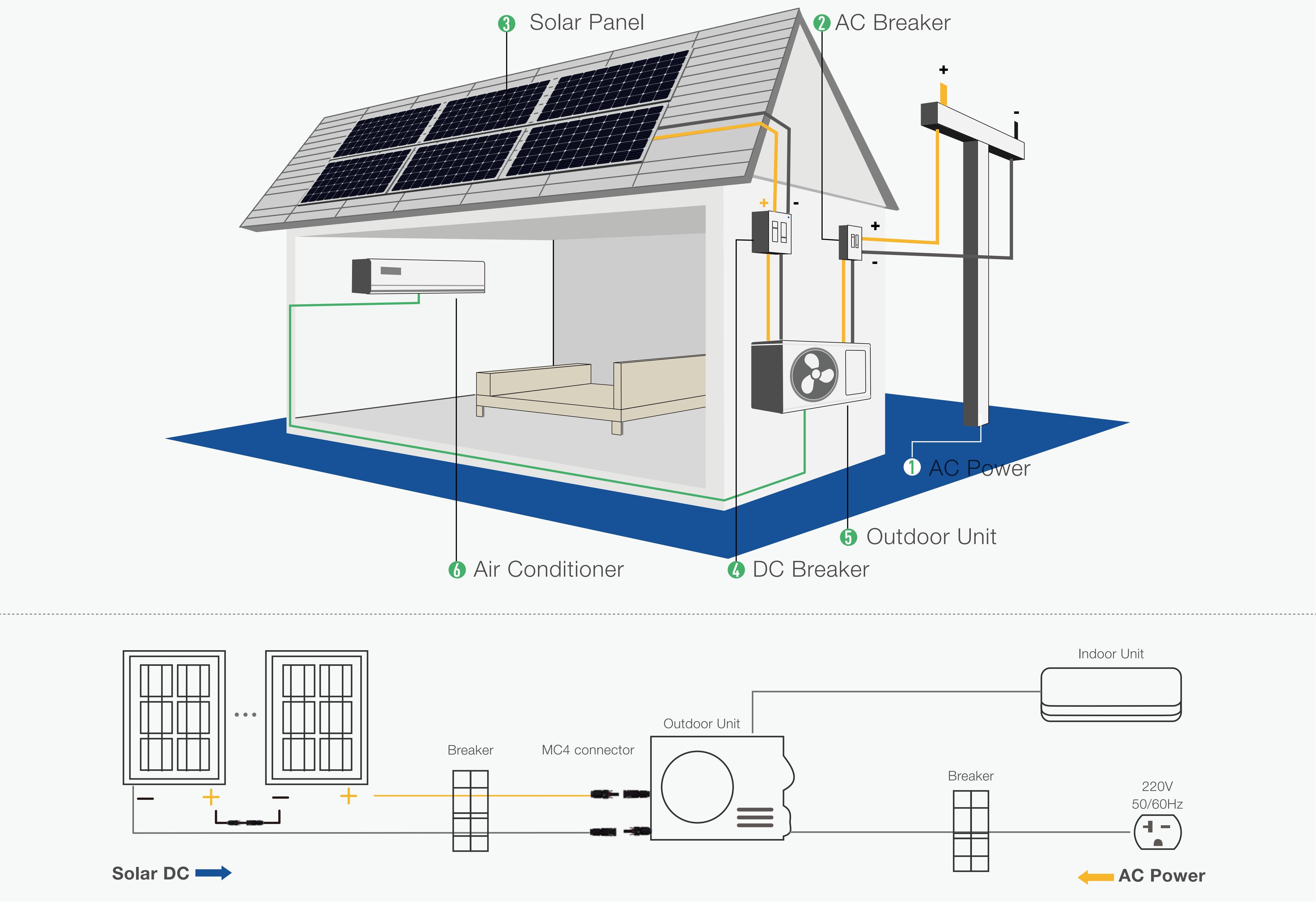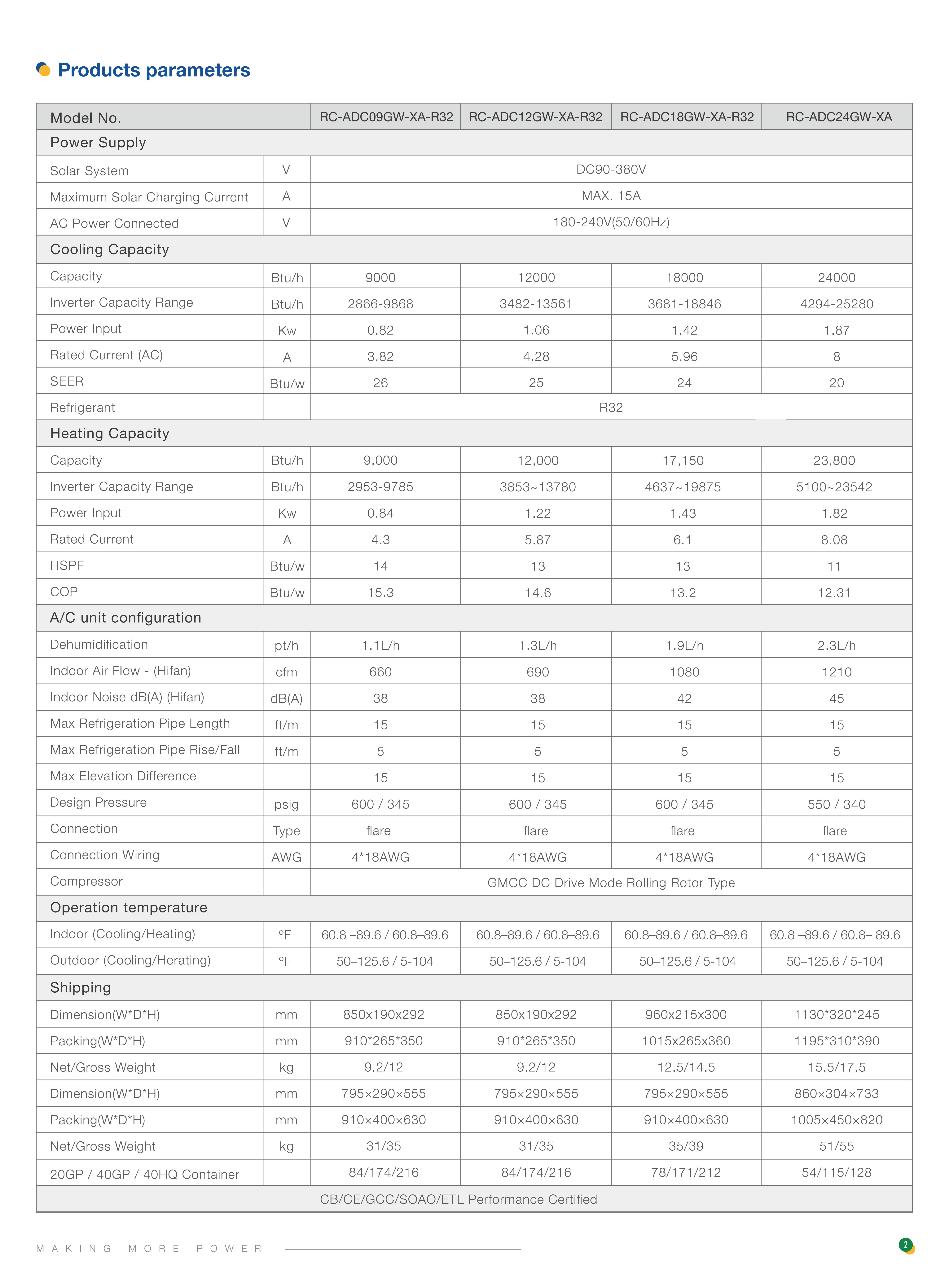The effectiveness and performance of solar air conditioning systems may depend on factors such as the climate, available sunlight, system size, and efficiency. Proper system design and installation are critical to maximize the advantages of solar air conditioning.
Solar panel voltage:
DC90-380VMaximum Solar Charging Current:
15AAC Power Connected:
180-240V(50/60Hz)Refrigerant:
R32Compressor:
GMCC DC Drive Mode Rolling Rotor TypeConnection:
Flare
Solar-powered air conditioning systems have several advantages over conventional air conditioning systems, including:
Energy efficiency: Solar air conditioning utilizes renewable energy from the sun, reducing reliance on fossil fuels and lowering carbon emissions. This makes it a more environmentally friendly option.
Cost savings: Solar energy is free, so using solar power for air conditioning can significantly reduce or eliminate electricity bills. The initial investment in solar panels may be higher, but over time, savings from reduced energy costs can outweigh the upfront expenses.
Independence from the grid: Solar air conditioning systems can operate independently of the electrical grid when equipped with battery storage. This provides energy security, especially during power outages or in remote locations where grid access is limited.
Long-term investment: Solar panels have a lifespan of 25-30 years, which means once installed, solar air conditioning systems can provide cooling for decades. This long-term investment can bring substantial financial benefits over time.
Increased property value: Adding a solar power system, including solar air conditioning, to a property can increase its value. Solar-powered homes are in demand and often sell at a premium due to their energy efficiency and reduced operating costs.
Reduced heat island effect: Traditional air conditioning systems release heat into the surrounding environment, contributing to the urban heat island effect. Solar air conditioning reduces this effect as it relies on renewable energy and emits less heat, thus lowering the overall environmental impact.
Flexible installation options: Solar air conditioning systems can be adapted to various building types, including residential, commercial, and industrial. They can be retrofitted onto existing structures or integrated into new construction projects.

Choosing a good solar air conditioner involves considering several important factors. Here are some key considerations to help you make an informed decision:
Cooling Capacity: Assess the cooling capacity of the solar air conditioner. It should be suitable for the size of the space you want to cool. Consider factors like room size, insulation, and local climate.
Energy Efficiency: Look for a solar air conditioner with high energy efficiency ratings. Check for a SEER (Seasonal Energy Efficiency Ratio) rating—the higher the SEER, the more efficient the system.
Solar Power Requirements: Determine the solar power requirements of the air conditioner. Consider the number of solar panels and their capacity needed to run the system efficiently. Ensure that your available space and solar resources can support the requirements.
System Integration: Consider if the solar air conditioner is compatible with other solar power systems and equipment you may have or plan to install. This includes inverters, batteries, and energy monitoring systems.
Durability and Reliability: Check the quality and reputation of the manufacturer. Look for warranties offered, customer reviews, and certifications like ENERGY STAR. A reliable solar air conditioner should be built to withstand harsh weather conditions.
Cost and Affordability: Compare the prices of different solar air conditioning systems, considering the initial investment, installation costs, and potential long-term savings on energy bills. Calculate the payback period to determine its cost-effectiveness.
Professional Installation: Ensure that the solar air conditioner requires professional installation and find out if it comes with installation services or recommendations for qualified installers in your area.
Additional Features: Consider any additional features or functionalities that may be important to you, such as remote control operation, programmable settings, air quality filters, or smart home integration.
Maintenance and Support: Inquire about the maintenance requirements of the solar air conditioner. Find out if the manufacturer provides support, servicing, and spare parts availability locally.
Local Regulations and Incentives: Familiarize yourself with any local regulations, permits, or incentives related to solar air conditioning. This includes potential tax credits, rebates, or subsidies that could help offset the costs.
By considering these factors, you can make a well-informed decision and choose a reliable, efficient, and cost-effective solar air conditioner suitable for your needs.

Solar air conditioning refers to a system that uses solar power to operate the cooling function of an air conditioning unit. Traditional air conditioning systems typically rely on electricity from the grid, whereas solar air conditioning harnesses energy from the sun using photovoltaic (PV) panels or solar thermal collectors.
The market for solar air conditioning has been growing steadily in recent years due to several factors. Here are some key points about the market:
Renewable Energy: Solar air conditioning systems are part of the broader trend toward renewable energy and sustainable technologies. As the world becomes more conscious of the environmental impact of energy consumption, solar air conditioning provides an eco-friendly alternative to traditional cooling methods.
Energy Cost Savings: Solar air conditioning can significantly reduce energy costs since it utilizes free solar energy instead of relying solely on electricity from the grid. By reducing or eliminating electricity consumption, users can save money on utility bills, particularly in regions with abundant sunlight.
Independence from the Grid: Solar air conditioning systems can operate independently from the electrical grid when equipped with battery storage solutions. This is particularly beneficial in areas with unreliable or expensive grid electricity, as users can enjoy continuous cooling even in the event of a power outage.
Government Incentives and Policies: Many governments and utilities offer financial incentives, tax credits, or rebates to promote the adoption of renewable energy technologies, including solar air conditioning. These incentives can make the initial investment more affordable and accelerate market growth.
Scalability: Solar air conditioning systems can be designed to fit various applications, from residential homes to commercial buildings. They can provide cooling for individual rooms or entire structures, making them adaptable to different cooling needs and sizes.
Environmental Benefits: Solar air conditioning systems help reduce greenhouse gas emissions since they generate electricity from a clean, renewable source. By using solar power instead of electricity produced from fossil fuels, these systems contribute to mitigating climate change and reducing reliance on non-renewable resources.
It's worth noting that the specific market conditions for solar air conditioning may vary by region, depending on factors such as sunlight availability, energy pricing, government policies, and consumer demand.
FAQs:
Q1: Do you support OEM/ODM?
A:Definitely, OEM&ODM service is supported with a certain quantity,including customize logo,package and label;
Q2: What's the production time?
A: The production time is normally 15 working days. but we will always prepare some stocks for popular models.
Q3: Can you provide DDP service?
A:Yes, if you are a personal customer and don't want to deal with the customs, we can provide DDP service to your address.
Q4: What about the warranty and how to claim?
A: Warranty period are 5 years since you receive the product, our professional after-sales team will deal with all warranty issues.